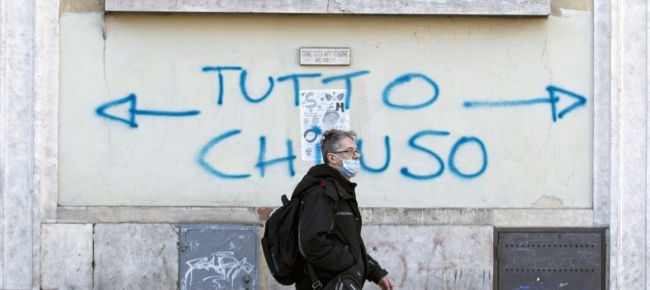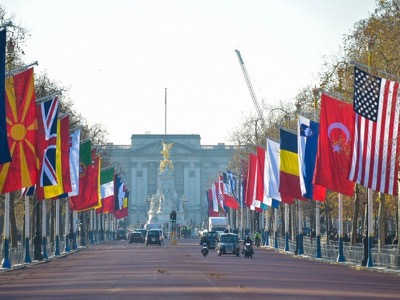Occultare la distruzione della Libia
Numan Abd al-Wahid, Internationalist 360°, 23 settembre 2020
 Gli inglesi, sia di destra che di sinistra, semplicemente non vogliono riconoscere il ruolo svolto dal loro governo nel distruggere la Libia e la conseguente crisi migratoria. “La distruzione della Libia ha causato il primo flusso migratorio dal Mediterraneo verso l’Europa”. The Strange Death of Europe di Douglas Murray identifica tre ondate migratorie verso l’Europa occidentale nel periodo postbellico. Inizialmente, la migrazione in Gran Bretagna e Francia proveniva dalle ex-colonie, per aiutare la ricostruzione negli anni ’50 e ’60. Anche altri Paesi dell’Europa occidentale invitarono persone da altrove per la ricostruzione. In secondo luogo, un’ondata di cittadini dell’Europa orientale arrivò negli anni ’90 e 2000 a causa dell’ampliamento dell’Unione europea. Il libro di Murray fu scritto sulla scia della terza e ultima ondata migratoria dell’ultimo decennio, aggravata dall’annuncio della cancelliera tedesca Angela Merkel, nell’agosto 2015 che accoglieva i rifugiati dalla guerra in Siria. In contrasto con la decisione di Merkel di consentire ai rifugiati siriani di entrare in Germania, Murray osserva che i Paesi che alimentano la guerra in Siria non erano ospitali come le nazioni europee. Scriveva: “In tutta la parte siriana della crisi dei rifugiati, quasi nessuno ha accusato i Paesi effettivamente coinvolti nella guerra civile, inclusi Iran, Arabia Saudita, Qatar e Russia, per il costo umano del conflitto. Non c’era ampio appello europeo all’Iran per accogliere i rifugiati dal conflitto, più di quanto non ci fosse pressione per insistere sul fatto che il Qatar avesse la giusta quota di rifugiati “. [i]
Gli inglesi, sia di destra che di sinistra, semplicemente non vogliono riconoscere il ruolo svolto dal loro governo nel distruggere la Libia e la conseguente crisi migratoria. “La distruzione della Libia ha causato il primo flusso migratorio dal Mediterraneo verso l’Europa”. The Strange Death of Europe di Douglas Murray identifica tre ondate migratorie verso l’Europa occidentale nel periodo postbellico. Inizialmente, la migrazione in Gran Bretagna e Francia proveniva dalle ex-colonie, per aiutare la ricostruzione negli anni ’50 e ’60. Anche altri Paesi dell’Europa occidentale invitarono persone da altrove per la ricostruzione. In secondo luogo, un’ondata di cittadini dell’Europa orientale arrivò negli anni ’90 e 2000 a causa dell’ampliamento dell’Unione europea. Il libro di Murray fu scritto sulla scia della terza e ultima ondata migratoria dell’ultimo decennio, aggravata dall’annuncio della cancelliera tedesca Angela Merkel, nell’agosto 2015 che accoglieva i rifugiati dalla guerra in Siria. In contrasto con la decisione di Merkel di consentire ai rifugiati siriani di entrare in Germania, Murray osserva che i Paesi che alimentano la guerra in Siria non erano ospitali come le nazioni europee. Scriveva: “In tutta la parte siriana della crisi dei rifugiati, quasi nessuno ha accusato i Paesi effettivamente coinvolti nella guerra civile, inclusi Iran, Arabia Saudita, Qatar e Russia, per il costo umano del conflitto. Non c’era ampio appello europeo all’Iran per accogliere i rifugiati dal conflitto, più di quanto non ci fosse pressione per insistere sul fatto che il Qatar avesse la giusta quota di rifugiati “. [i]
Prendiamo Murray in parola e mettiamo da parte le indicazioni di sostegno britannico ai cosiddetti ribelli siriani già nel 2012. Se si legge tra le righe tale estratto e si scompone ciò a cui si riferisce come “porzione siriana”, abbiamo di fronte l’altra parte della crisi migratoria. Vale a dire, quella stimolata dalla campagna della NATO per rovesciare il Colonnello Ghadhaffi in Libia. La cosiddetta “primavera araba”, iniziata col rovesciamento relativamente pacifico dei governi di Tunisia ed Egitto all’inizio del 2011, fu seguita da una rivolta a Bengasi, nella Libia orientale, che rapidamente divenne rivolta. I media occidentali inventarono scenari su come Gheddafi fosse sul punto di compiere massacri dopo massacri se l’occidente non fosse intervenuto. Così, il collega etoniano di Douglas Murray, David Cameron, allora primo ministro britannico, guidò la campagna globale militare in Libia nel 2011 per prevenire questa presunta orribile punizione. Cameron fu sostenuto negli appelli a intervenire in Libia da tutti i media britannici. Soprattutto quelli di destra cui Murray attualmente da ai lettori le sue opinioni. Nel 2011, il Daily Telegraph voleva vedere un’azione militare a sostegno dell’“opposizione” contro il Colonnello Gheddafi. Ad esempio, all’inizio di marzo 2011, la spinta inglese a bombardare la Libia fu mascherata come iniziativa occidentale: un rapporto affermò che “l’occidente è pronto a usare la forza contro Gheddafi” perché per Cameron, “… La caduta di Gheddafi fu la“ massima priorità ”della Gran Bretagna, aggiungendo: “Se aiutare l’opposizione in qualche modo riuscisse ad ottenere questo risultato, è certamente una cosa che dovremmo considerare… In quanto tali individui vicini all’esercito inglesi informarono i lettori che era pronta la “missione libica””. I piani d’intervento inglesi si scontrarono con un ostacolo, secondo Christopher Hope del Telegraph, quando altri leader mondiali rifiutarono l’idea. Qui Obama fu chiaramente individuato come ostacolo alla spinta inglese all’intervento militare o piuttosto a una no-fly zone. L’11 marzo 2011, un altro rapporto del Daily Telegraph apertamente mise in dubbio la natura della strategia di Obama: “È vigliaccheria? È indecisione? O è diplomazia intelligente?” prima di concludere che a causa delle “dimensioni e potenza militare degli USA, il presidente nordamericano non ha la possibilità di rimanere neutrale sempre…” Come tutti sappiamo, la Gran Bretagna ha sempre saputo cosa sia meglio quando si tratta quale direzione dovrebbe prendere la politica estera nordamericana.
Un articolo sul Sunday Telegraph del 13 marzo confrontò l’impulso di Cameron ad intervenire in Libia con la “paralisi” di Obama. L’autore continuava a “sperare” che Obama “segua l’esempio di Cameron, poiché Clinton ha seguito l’esempio di Blair in Kosovo”. Tuttavia, l’autore ebbe l’onestà di sostenere che nell’interesse della Gran Bretagna: “L’argomento della Libia non è puramente o addirittura principalmente umanitario, tuttavia. Anche se si mette da parte l’importanza come nazione produttrice di petrolio, la Libia rimane centrale negli interessi strategici e commerciali della Gran Bretagna nella regione”. È del tutto naturale che l’editoriale del Telegraph nei successivi due giorni era che il “silenzio” di Obama “danneggia l’occidente” (l’”occidente” era la metafora generica che significa interessi inglesi. Uno dei modi in cui il silenzio danneggiava l’”occidente” è perché: “… restare fuori dalle liti altrui nella regione più instabile e ricca di petrolio del pianeta non è una politica estera realistica”. Inoltre, Daily Telegraph indicò che Cameron trovava “frustrante” lavorare con Obama. [ii] Ciò è confermato nell’autobiografia di Cameron dove scrive senza scusanti di voler istituire la no fly zone per impedite il presunto possibile massacro, ma scoprì che Obama era d’ostacolo e doveva essere convinto ad intervenire militarmente in Libia. Nel 2016, un rapporto del parlamento inglese sull’intervento in Libia ammise di “non poter verificare l’effettiva minaccia ai civili rappresentata dal regime di Gheddafi; scelse elementi nominali dalla retorica di Muammar Ghadhaffi… “e che il governo britannico”, non identificò l’estremismo islamista nella ribellione”. Quindi, si basò su “ipotesi errate”. Di conseguenza, la distruzione della Libia causò il primo flusso migratorio dal Mediterraneo all’Europa. Prima del 2011, secondo fonti aperte, la Libia era un punto di destinazione per milioni di lavoratori migranti africani. Le cifre non sono definitive, ma durante i miei viaggi in Tunisia fui informato in modo attendibile che almeno 900000 tunisini lavoravano in Libia. Altri cittadini che lavoravano in Libia prima dell’intervento della NATO erano 1,5 milioni di egiziani e 1,5 milioni dell’Africa subsahariana ed altri. Inoltre, l’intervento della NATO costrinse milioni di libici a fuggire dal Paese e a sfollarne internamente centinaia di migliaia di altri. Il quotidiano Le Monde riferì che dal 2014 c’erano 600000 – 1 milione di rifugiati libici in Tunisia.
Questa “porzione” della Primavera araba fu sottovalutata nel libro di Murray. Le ricadute umane dell’intervento di Cameron in Libia ammontarono a milioni di rifugiati. Milioni di africani tornarono nei Paesi d’origine o intrapresero il pericoloso viaggio sul Mediterraneo verso l’Europa. Un’altra dimensione dell’intervento libico fu, come sostiene lo storico Mark Curtis, l’alleanza di fatto tra i bombardamenti di Gran Bretagna e Francia e combattenti islamisti. Inoltre, secondo Curtis, la Libia post-Gheddfi divenne centro di addestramento dei jihadisti poi mandati in Siria. Circa 3000 combattenti tunisini e libici si recarono in Siria per unirsi a gruppi di al-Qaida come Qatibat al-Batar al-Libi, fondato dai libici. Prima del 2015, Murray afferma che più persone sbarcavano a Lampedusa perché “in parte ciò era dovuto alle persone in fuga da cambi di governo e disordini civili”. [iii] Presumo fosse un modo subdolo per dire che fuggivano dall’operazione di cambio di regime di Cameron in Libia. Poi osserva che “il primo anno della Primavera araba fu un periodo particolarmente brutto per l’isola”. [iv] Niente merda, Sherlock! Tre anni dopo, nel 2014, “… l’anno prima che la crisi dei migranti” iniziasse, “170000 persone arrivarono [a Lampedusa, Malta o Sicilia]. I funzionari parlavano di risolvere il problema colmando il vuoto del governo libico” [v]. Questo vuoto arrivò per via aerea, atterrò sulle coste libiche e non ebbe niente a che fare con David Cameron.
Murray delizia costantemente i lettori su terrorismo e stupri presumibilmente commessi da migranti. [vi] Eppure, per qualche ragione, non aveva spazio o tempo per informare i lettori del terrorismo sessuale più atroce e depravato dell’ultimo decennio. Vale a dire, il governo inglese invitò centinaia di libici, che aderirono all’azione inglese contro il Colonnello Gheddafi nel 2011, in Gran Bretagna per addestrarsi nel 2014. Piccoli gruppi di tali traditori libici (o “cadetti” come li chiamava il Guardian) lasciarono le baracche di Bassingbourn per aggredire la popolazione locale e tre furono condannati per aver violentato un uomo. Infatti, da quando arrivarono nell’estate 2014, la polizia fu costretta a condurre “frequenti pattugliamenti presso la base di Bassingbourn poiché i residenti del vicino villaggio temevano “fughe e attacchi”.” Ci si può solo chiedere perché Murray evitò di menzionare tale pessimo episodio. Perché la colpa alla fine sarebbe stata dell’allora primo ministro britannico David Cameron? Complessivamente, sostiene Curtis, l’intervento di Cameron in Libia finora stimolava attacchi terroristici in 14 Paesi diversi, incluso il più orribile in Europa avvenuto a Parigi nel 2015. Il capo della cellula Abdalhamid Abaud degli attacchi terroristici al Bataclan di Parigi, che uccise 129 persone, fu addestrato da un gruppo nato dai disordini causati dall’intervento in Libia. Tornando al 2011, non appena Cameron guidò l’assalto per distruggere la Libia, iniziò a rullare i tamburi militari per la Siria. Ancora una volta, tale storia non viene raccontata dalla lettura di Murray della guerra in Siria. Per lui, i principali attori esteri in quella guerra erano Iran, Arabia Saudita, Qatar e Russia. Tuttavia, nel marzo 2012, Cameron volò negli Stati Uniti per tentare di convincerli ad impegnarsi ulteriormente nella guerra alla Siria. In un’intervista con Niall Ferguson lamentò la mancanza di interesse di Washington ad intervenire in Siria. Nell’estate 2012, dopo che la metà orientale di Aleppo fu invasa dall’opposizione (cioè i jihadisti), un rapporto dell’Indipendente notò che l’intelligence inglese aiutava i jihadisti indicando i movimenti delle truppe dell’Esercito arabo siriano. Affermò anche: “Si si ritiene che MI6 e CIA tacitamente permettano l’invio di mitragliatrici pesanti dai Paesi del Golfo ai ribelli… un diplomatico [allora] negò che gli inglesi “facilitassero” la fornitura di mitragliatrici pesanti. Ma… disse di non poter escludere la possibilità che appaltatori privati finanziati da Paesi come il Qatar fossero coinvolti nella fornitura di armi”.
The Strange Death of Europe cita Merkel non meno di 58 volte, mentre cita Cameron solo cinque. È abbastanza chiaro che l’obiettivo di Murray è mascherare e assolvere la colpevolezza inglese sulle crisi migratorie e conseguente caos. Per Murray, la crisi migratoria dell’ultimo decennio è imperniata e individua nella disprezzata Merkel, soprattutto dopo il discorso del 31 agosto 2015 che consentì ai rifugiati siriani di entrare in Europa. In quanto neoconservatore, sarebbe anatema per lui anche solo suggerire che la politica estera britannica, di Cameron, inviabdo l’esercito in Libia, fosse persino un fattore nella crisi migratoria. Si è costretti a chiedersi se l’obiettivo del libro sia attribuire con nonchalance, anche patologicamente, la colpa della crisi migratoria Merkel piuttosto che al suo collega etoniano David Cameron. Nella postfazione dell’edizione tascabile del libro, Murray si vanta che nessuno a da ridire sui fatti contenuti nel libro o “persino tentato di contestarli o negarli”. [vii] Forse la ragione di ciò è che molti divenuti suoi detrattori, sostennero l’intervento libico. Se dovessero sostenere che esso causò e stimolò la crisi migratoria, ciò significherebbe che il loro sostegno o acquiescenza era sbagliato. Ad esempio, i compagni di sinistra che dirigono il gruppo Stop the War Coalition, non si convinsero ad opporsi apertamente alla guerra alla Libia. Durante i sette mesi di bombardamenti della NATO organizzarono una manifestazione a Londra, a metà settimana, in cui parteciparono non più di 35 persone. Tutti i media inglesi sostennero l’intervento in Libia e quando i ribelli islamisti catturarono Gheddafi dopo che la NATO l’aveva localizzato e bombardato, lo linciarono e violentarono, e il Guardian celebrò e gongolò il giorno dopo in prima pagina, che questa era la “Morte di un dittatore”.
Organizzazioni anglo-musulmane di alto profilo erano pienamente d’accordo. L’Associazione Musulmana della Gran Bretagna, collegata alla Fratellanza Musulmana, appoggiò la NATO e il direttore estero del gruppo per i diritti umani,Cage, Muazam Biq, ex-detenuto di Guantanamo Bay, non solo sostenne l’insurrezione, ma confermò le conclusioni di Curtis secondo cui molti jihadisti libici furono la fanteria della NATO ed immediatamente formarono gruppi per il cambio di regime in Siria. Biq affermò che “molti che… avevano iniziato la rivoluzione in Libia e vi parteciparono militarmente, avevano esperienza e continuarono a creare e sostenere alcuni primi movimenti dir esistenza in Siria”. Biq inoltre spiegò che quando era in Libia nel 2012, l’allora primo ministro turco Erdogan visitò e tenne un discorso che registrò. Erdogan disse ai libici “oggi la Libia, ghaddan (cioè domani) la Siria”. Chiarì il suo appoggio al cambio di regime… “da fare in Siria, come fu fatto in Libia”. Prima di recarsi in Siria, Biq incontrò l’agenzia d’intelligence inglese MI5.
Inoltre, un intero movimento socioculturale di intellettuali accademici associato allo studio della resistenza all’imperialismo occidentale nel Sud del mondo nelle università occidentali tacque. Il professor Laleh Khalili definiva Murray “razzista elegante e disinvolto”, ma battutine come questo sono molto più facili da esprimere che porre domande per approfondire la propria acquiescenza all’intervento militare in Libia. L’attuale nemesi di Murray, il professor Priyamvada Gopal si limita a denunciare e classificare come “gheddafista” chiunque metta in dubbio la cosiddetta ribellione in Libia o l’intervento della NATO. È incredibile come questi e molti altri intellettuali fossero reticenti mentre un Paese africano veniva distrutto dalla NATO creando milioni di rifugiati, libici e non libici, eppure si vantano di come le loro pubblicazioni celebrino la resistenza all’imperialismo occidentale o di come utilizzano citazioni da “How Europe Underdeveloped Africa” di Walter Rodney. Nonostante tutti i difetti, la Libia di Gheddafi aumentò l’aspettativa di vita da 51 a 74 anni. L’analfabetismo fu spazzato via e il problema dei senzatetto era pressoché inesistente. Il reddito medio pro capite era tra i più alti in Africa, 16500 dollari. [viii] In realtà sostenne Nelson Mandela e l’African National Congress nella lotta contro l’apartheid in Sud Africa. Ma tutto questo non significa nulla per questi e altri guerrieri culturali sistematisi nelle torri d’avorio occidentali che scambiano continuamente litigi coi passanti nel cortile della scuola con minacce al loro posto di lavoro. Inoltre, nella postfazione del libro Murray copre brevemente l’omicidio di 22 persone a Manchester da parte di un terrorista che sembra fu addestrato in Libia. È del tutto naturale che Murray non porti all’attenzione dei lettori che la famiglia del terrorista se ne andò rapidamente da Manchester, dove le fu concesso esilio, unendosi alla ribellione in Libia contro il Colonnello Ghadhaffi e che vi sarebbe stato addestrato dopo che la Libia divenne terra di nessuno dei gruppi jihadisti in guerra per il territorio.
In conclusione, l’intervento di Cameron è simile al colpo di Stato in Iran del 1953, anch’esso avviato e guidato dagli inglesi. Il primo ministro iraniano Mossadegh tolse l’industria petrolifera dalle mani della multinazionale inglese nazionalizzandola. Gli inglesi allora convinsero i nordamericani per garantirsi il rovesciamento di Mossadegh. Le ripercussioni del colpo di Stato del 1953 portarono non solo alla rivoluzione iraniana, ma anche all’ascesa dei movimenti militanti in Germania come la Fazione dell’Armata Rossa. Se allora non ci fosse stata la rivoluzione iraniana, non ci sarebbe stata la guerra Iran-Iraq e il resto è storia. [ix] Come col colpo di Stato in Iran, gli inglesi, di destra e di sinistra, semplicemente non vogliono riconoscere e persino nascondono il ruolo del governo britannico nella distruzione della Libia e nelle crisi migratoria derivatane. Finora, l’intervento libico portò a una pioggia di migranti in Europa, e la missione in Siria per il cambio di regime portò ad altri rifugiati e attentati terroristici in Europa. Chissà dove andrà a finire il loro ritorno. Inoltre, secondo Murray, i migranti si riversano in Europa perché vogliono uno standard di vita migliore, ricevere sostegno statale e perché il continente è molto più pacifico e tollerante di altri posti nel mondo. [x] O evidentemente può darsi che nell’ultimo decennio i migranti sono accorsi in Europa perché gli interventi militari degli inglesi (in collusione con jihadisti e Stati che li sostengono) hanno distrutto i loro Paesi e non ebbero scelta se non cercare un altro posto dove vivere.

[i] Douglas Murray, “The Strange Death of Europe: Immigration, Identity, Islam” (London: Bloomsbury Continuum, 2018), pag. 159
[ii] Per un resoconto dettagliato della richiesta d’intervento militare da Telegraph e Times, vedasi Numan Abd al-Wahid, “Britain’s Libya Adventure“.
[iii] Murray, op. cit., pg65
[iv] ibid., pg.66
[v] ibid., pg73
[vi] ibid., pg.153-4, pg.185-186, pg.194-7
[vii] ibid., pg.335
[viii] Maximilian Forte, “Slouching Towards Sirte: NATO’s War on Libya and Africa”, (Montreal: Baraka Books, 2012), pg.143-144
[ix] Numan Abd al-Wahid, “Debunking the Myth of America’s Poodle: Great Britain Wants War” (Winchester: Zero Books, 2020), pag.108-110
[x] Murray, op. cit., pag. 59
Traduzione di Alessandro Lattanzio





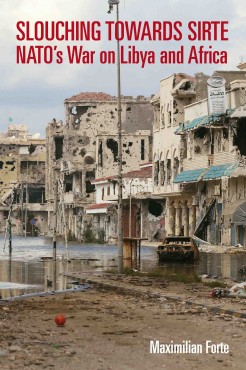
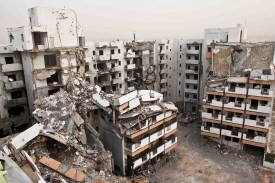 Far from the success NATO boasts about or the “high watermark” proclaimed by proponents of the “Responsibility to Protect,” this war has left the once prosperous, independent and defiant Libya in ruin, dependency and prolonged civil strife.
Far from the success NATO boasts about or the “high watermark” proclaimed by proponents of the “Responsibility to Protect,” this war has left the once prosperous, independent and defiant Libya in ruin, dependency and prolonged civil strife.


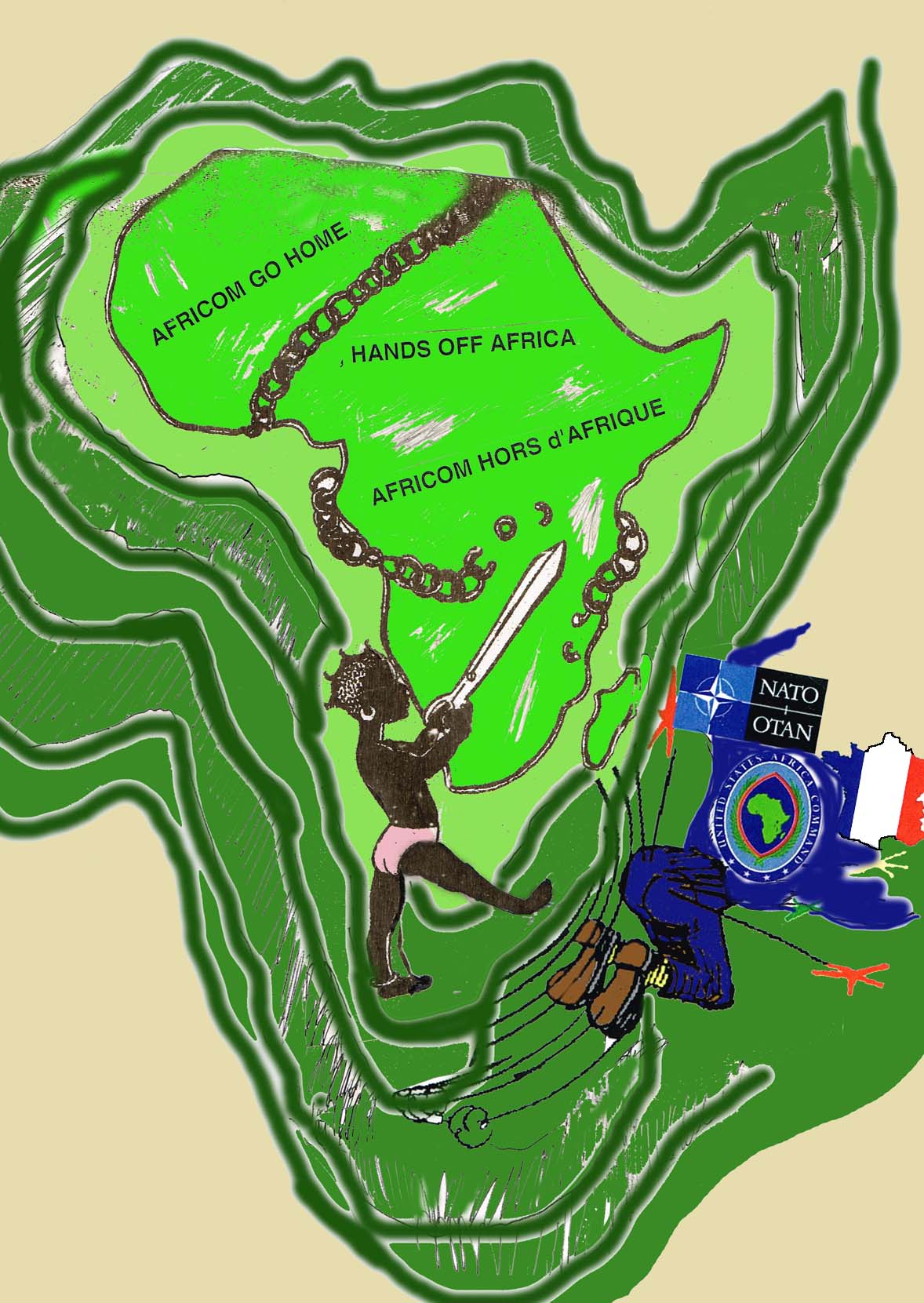

 In order to achieve conscious responsibility on the part of the population, the authorities should offer coherence. They have not done so in the past and they do not do so now. In the third interview with Dr. Leopoldo Salmaso (specialist in Infectious and Tropical Diseases, and Public Health, who has worked for 30 years at the Department of Infectious Diseases of the Padua Teaching Hospital (Italy), and 5 years in Tanzania, controlling epidemics like Cholera, Thyphoid, Hemorrhagic Fevers, and intra-hospital Polio), he insists on letting the figures speak for themselves.
In order to achieve conscious responsibility on the part of the population, the authorities should offer coherence. They have not done so in the past and they do not do so now. In the third interview with Dr. Leopoldo Salmaso (specialist in Infectious and Tropical Diseases, and Public Health, who has worked for 30 years at the Department of Infectious Diseases of the Padua Teaching Hospital (Italy), and 5 years in Tanzania, controlling epidemics like Cholera, Thyphoid, Hemorrhagic Fevers, and intra-hospital Polio), he insists on letting the figures speak for themselves. 
